Exchange Rates
1/23
There's no tags or description
Looks like no tags are added yet.
Name | Mastery | Learn | Test | Matching | Spaced | Call with Kai |
|---|
No analytics yet
Send a link to your students to track their progress
24 Terms
Exchange Rate Systems
An exchange rate is the price of one currency in terms of another e.g. £1 = €1.18
International currencies are essentially products that can be bought & sold on the foreign exchange market (forex)
The Central Bank of a country controls the exchange rate system that is used in determining the value of a nation's currency
There are three exchange rate systems
A floating exchange rate
A fixed exchange rate
A managed exchange rate
Exchange Rate Systems
Exchange Rate System | Explanation |
|---|---|
Floating
|
|
Fixed
|
|
Managed
|
|
Factors Influencing Floating Exchange Rates
Numerous factors influence floating exchange rates, resulting in an appreciation or depreciation of a currency
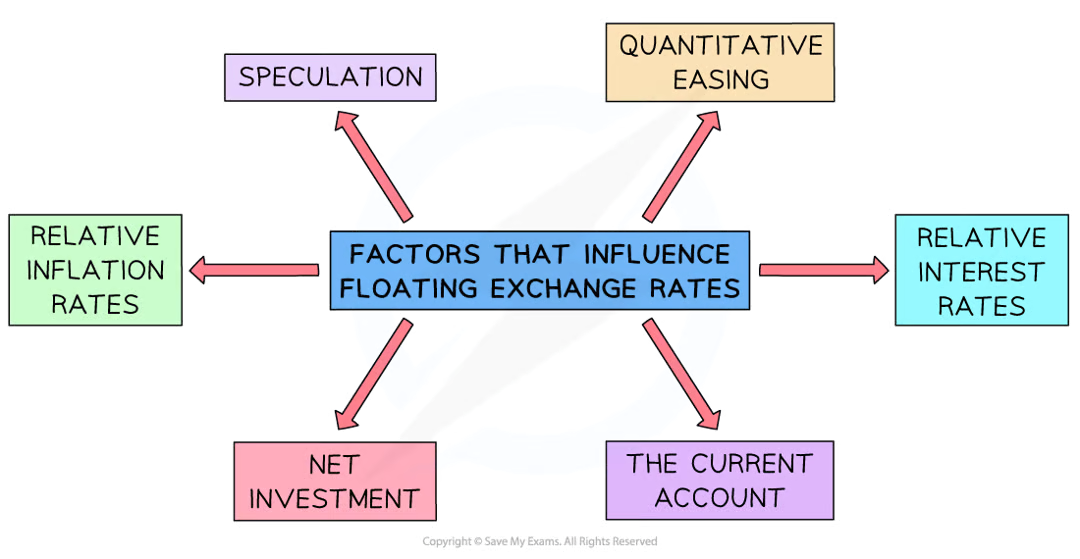
Relative interest rates:
influence the flow of hot money between countries. If the UK increases its interest rate, then demand for £'s by foreign speculators increases & the £ appreciates. If the UK decreases its interest rate, then the supply of £'s increases as speculators sell their £'s in favour of other currencies & the £ depreciates
Relative inflation rates:
as inflation in the UK rises relative to other countries, its exports become more expensive so there is less demand for UK products by foreigners, which means there is less demand for £s & so the £ depreciates
Net investment:
oreign direct investment (FDI) into the UK creates a demand for the £ which leads to the £ appreciating. FDI by UK firms abroad creates a supply of £'s which leads to the £ depreciating
The current account:
UK exports have to be paid for in £'s. UK imports have to be paid for in local currencies, which requires £'s to be supplied to the forex market. Due to this, an increasing trade surplus will result in an appreciation of the £ & an increasing deficit will result in a depreciation of the £
Speculation:
the vast majority of currency trades are speculative. Speculation occurs when traders buy a currency in the expectation that it will be worth more in the short to medium term, at which point they will sell it to realise a profit
Quantitative easing:
involves increasing the money supply & much of the new supply is used to buy back gilts. Many of these gilts are owned by foreigners who then exchange the £s received for their own currency. The increase in the supply of £'s depreciates the £
Intervention in Markets Using Forex Transactions & Interest Rates
Changing interest rates: if the Central Bank wants to appreciate the country’s currency, it would raise interest rates thereby making it more attractive for foreigners to move money into the country's banks (hot money). Decreasing interest rates has the opposite effect & causes a depreciation
Buying & selling currency in the forex market: The Central Bank can change the demand or supply for their currency using their reserves. If they want to appreciate the currency then they buy it on the forex market using foreign currencies e.g. to bolster the value of the £, the Central Bank could take US$'s from their reserves & buy £'s. If they want to depreciate the currency then they sell their own currency & buy foreign currencies
The Consequences of Competitive Devaluation/depreciation
When a currency is intentionally devalued/depreciated by a government, it makes the country's exports cheaper
If demand for their exports is price elastic, then the country is likely to experience higher export volumes & higher export revenues
E.g. for many years China prevented the value of their currency from appreciating & saw a boom in their export sales
Intentional devaluation/depreciation has several consequences
It is anticompetitive & upsets international competitors
Large countries usually have more financial resources to manipulate markets & so gain unfair advantages over smaller countries
Other countries may respond by also lowering the value of their currencies resulting in very little change to market share
The devaluation/depreciation raises the cost of imports used in production & with little change to the value of exports - profits decrease
Impacts of Changes in Exchange Rates
Changes to exchange rates may have far-reaching impacts on an economy
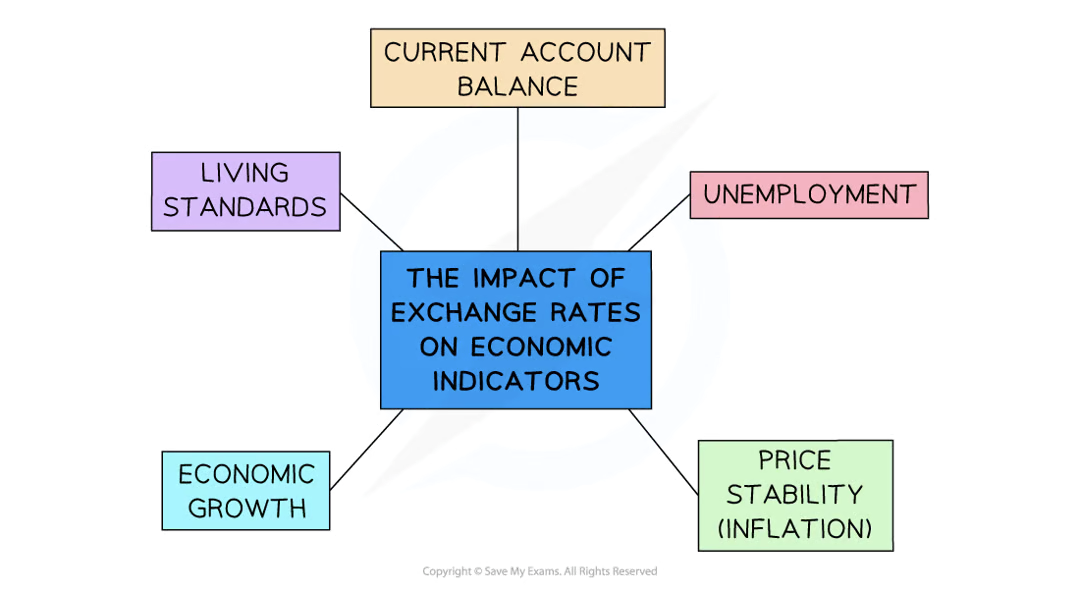
The impact of changes to exchange rates on an economy
Economic Indicator | Explanation |
|---|---|
The Current Account |
|
Economic growth |
|
Inflation |
|
Unemployment |
|
Living standards |
|
Foreign direct investment (FDI) |
|
Floating exchange rates:
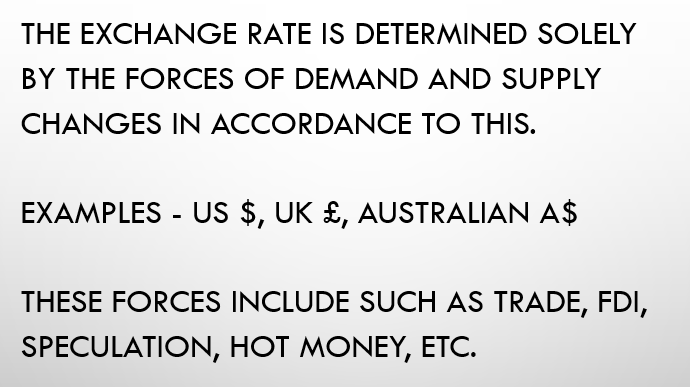
Advantages and disadvantages of floating exchange rates
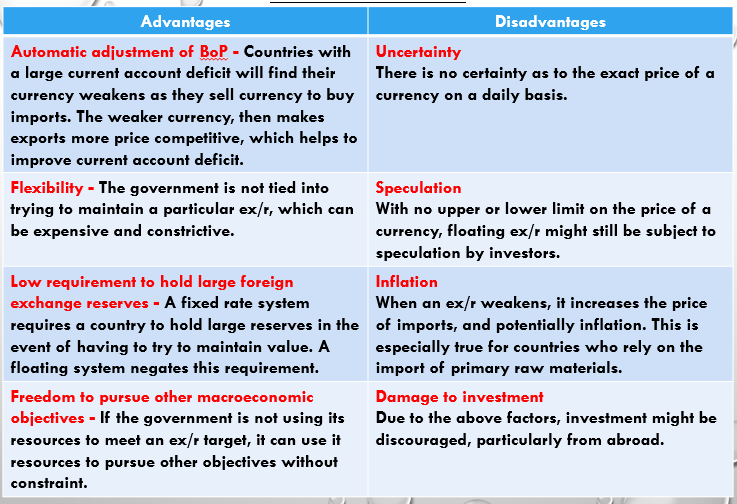
Fixed exchange rates:
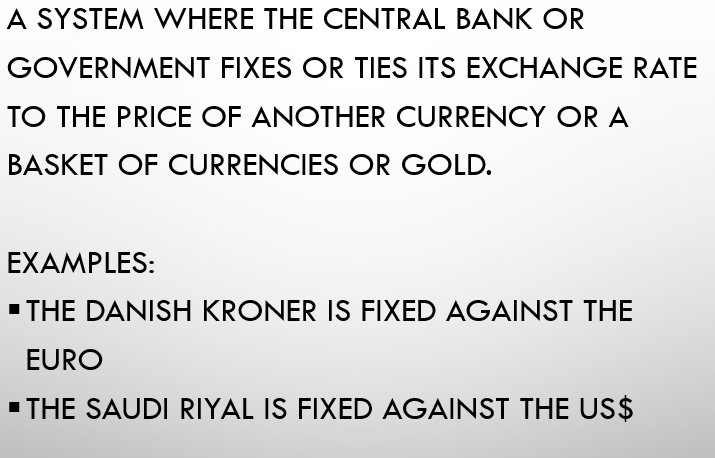
CHARACTERISTICS OF A FIXED EXCHANGE RATE SYSTEM
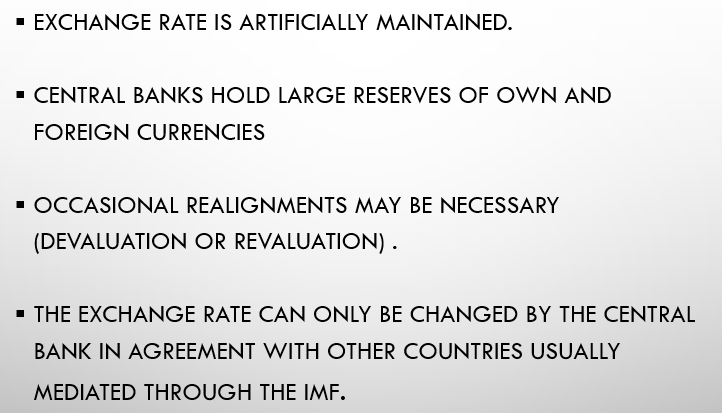
Advantages and disadvantages of fixed exchange rates
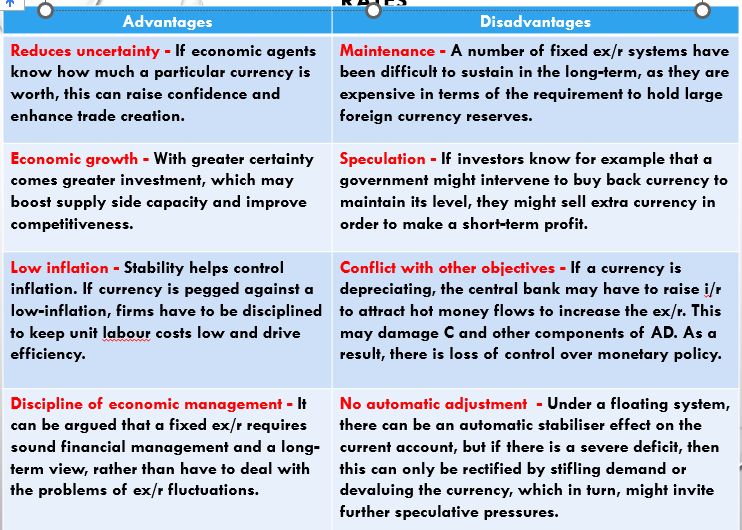
Managed floating exchange rate
Exchange rate is primarily determined by demand and supply, but the central bank or government may intervene on occasion to influence its value (in the event of a danger of the upper or lower limits being breached).
The exchange rate is controlled through the buying and selling of the country’s currency on the forex market and through changes in interest rates.
The currency becomes a key target of monetary policy
Higher rate as instrument to stabilise inflation
- ‘competitive devaluation’ to improve competitiveness
Managed floating was a policy pursued in the UK from 1973-1990
Distinction between revaluation and appreciation and devaluation and depreciation of a currency
Revaluation and devaluation occurs under a fixed ex/r system when a government decides to officially adjust the value of its currency upwards or downwards.
Appreciation or depreciation occurs under a floating ex/r system when the value of a currency changes due to D&S.
Which Factors influence the value of a currency in a floating exchange rate system?
Relative inflation rates
Relative interest rates
The CA of the Balance of Payments –
Net investment
Speculation – (hot money)
Quantitative Easing
Domestic and global income levels